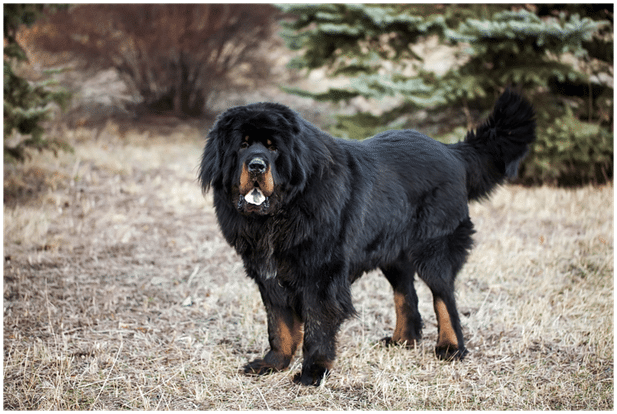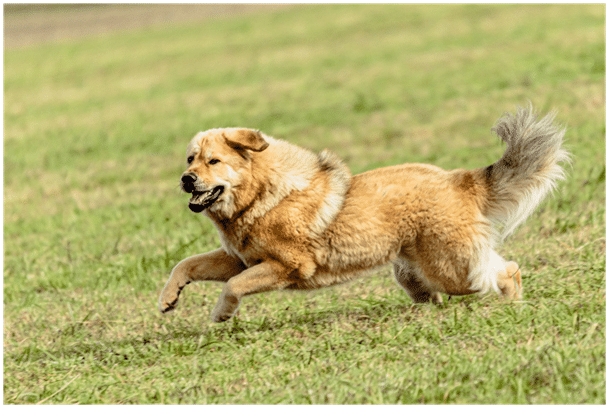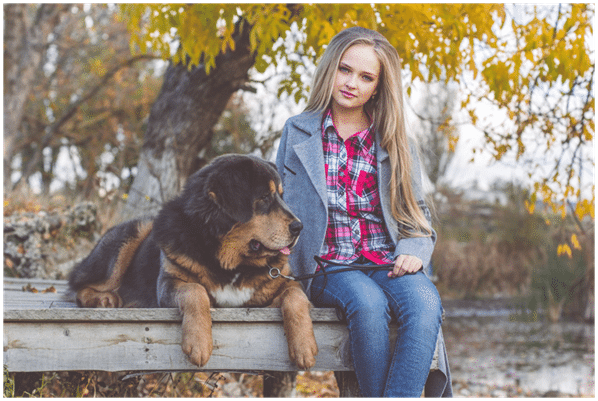Tibetan Mastiffs have a reputation for being a durable and hearty breed, but how long do they actually live?
A Tibetan Mastiff’s lifespan ranges from twelve to fifteen (12 – 15) years, depending on the internal and external factors that may positively or negatively influence their lifespan. Some of these factors include a healthy diet, regular exercise, mental stimulation, attention to environmental factors, companionship, and socialization.
Their lifespan is affected by many factors, in which we explore in detail in this article along with providing practical tips to enhance their longevity.
Common health problems of Tibetan Mastiffs
Tibetan Mastiffs are good guard dogs, and you are likely making a great choice if you are seeking a dog that will be excessively protective of you.
However, before you consider getting this breed, you should know some common health conditions the Tibetan Mastiff may develop that affect how long they live.
Here is a list of some of these health conditions:
- Hyperthyroidism
- Canine Inherited Demyelinative Neuropathy (CIDN)
- Hip Dysplasia and Elbow Dysplasia
- Skin Irritation
- Mange
- Geriatric Cataracts
- Panosteitis
- Ear Infections
- Progressive Retinal Atrophy (PRA)
- Distichiasis
- Malocclusion
- Osteochondrosis Dissecans (OCD)
- Epilepsy
- Entropion
- Ectropion
While there are a number of health conditions to be mindful of, we explore the various factors that are likely to impact the life expectancy of a Tibetan Mastiff (along with nine things you must know!).

1. Tibetan Mastiff breeding and genetics.
Like many other dog breeds, Tibetan Mastiffs are also predisposed to a range of hereditary conditions that can affect how long they live. These can also come about as a result of poor breeding. These genetic defects include:
- Epilepsy and Seizures
- Hemophilia
- Progressive Retinal Atrophy (PRA)
- Musculoskeletal problems
- Cataracts
- Mange
- Separation Anxiety and so on.
Breeding a Tibetan Mastiff poorly can increase the chances of genetic defects, resulting in their lifespan being compromised.
In contrast, properly breeding your Tibetan Mastiff will reduce the chances of being predisposed to genetic conditions.
2. Healthy diet
Each dog breed has superior, dominant, or prevalent health conditions common with the breed. A Tibetan Mastiff is of no exemption.
However, feeding your pup with the right, high-quality, healthy diet is critical. This includes providing them with crucial minerals and vitamins essential for their growth and health.
This will be instrumental in minimizing the probability and severity of these health conditions common to the breed.
If humans can widely say that “You are what you eat,” the same can apply to dogs. Just as humans prioritize a healthy diet, the same should apply to dogs.
It’s not just about feeding your pup enough food, it’s about giving them fresh, high-quality food that will enhance their overall health.
While it’s clearly an unhealthy practice to feed your pup with inadequate food and nutrients, it’s not as bad as overfeeding him. Overfeeding a dog leads to obesity. Obesity reduces a dog’s lifespan and leads to several other health complications.
3. Regular Exercise

Regular exercise is a vital factor that influences the lifespan of a Tibetan Mastiff. Adult Tibetan Mastiffs need at least an hour of daily exercise to keep them healthy and in shape, along with being active and purposeful.
When denied regular exercise, Tibetan Mastiffs tend to become bored and restless. This can result in undesirable behavior including destructive chewing.
Frequent exercise will reduce the chance of your dog getting significantly overweight, and lessen its risk of facing dangerous and life-threatening health conditions. This makes regular exercise a critical element in the daily life of a Tibetan Mastiff.
Ensure that you subject your young Tibetan Mastiff to moderate exercise. This can include daily walks or other physical activities such as ball games or similar.
Moderation is the key when it comes to exercise. Their growing bones, joints, and ligaments are soft, and subjecting them to much exercise too early can damage their bones, joints, and ligaments. A common orthopedic condition to be aware of is canine hip dysplasia.
Canine hip dysplasia (CHD) is a condition that can affect the hips of any dog breed, but it is most commonly seen in large breeds such as Tibetan Mastiffs.
The condition is caused by a malformation of the hip joint, which can lead to pain and lameness. CHD is considered to be a hereditary condition, though environmental factors can also play a role in its development.
There is no cure for CHD, but there are various treatment options available that can help to improve the quality of life for affected dogs. Treatment options include weight management, exercise modification, pain relief medication, and surgery.
4. Receiving proper Veterinary and Health Care
While it is crucial to provide your pup with adequate medical care, regular grooming, cleaning his teeth, and brushing off the loose hair are equally important. Proper bathing, trimming his paws’ nails, are also key in keeping your pup healthy.
You may know your pup well, but your veterinarian is professionally trained to identify potential health issues and proactively manage your dog’s health.
There are several health conditions that you may not easily detect; seeing a professional frequently can save your pup from these life-threatening conditions.
Get the help of a veterinarian or a veterinary nutritionist to know the right diet you should feed your pup with and his nutritional requirements. Get the help of a veterinarian in case your Tibetan Mastiff develops health complications.
5. Brushing their teeth
Like humans, dogs are also prone to dental diseases, and Tibetan Mastiffs are more susceptible to dental diseases than most other family dogs.
Occasionally, it starts with a plaque or tartar build-up on the teeth, which later can infect the gums and roots of their teeth.
Studies have revealed that dogs that sniff in outdoor pesticides are more prone to developing canine malignant lymphoma, a form of cancer that affects dogs.
If not treated appropriately, infection and a range of other issues may result, affecting the health of your pup.
Your Tibetan Mastiff faces the risk of having damaged kidneys, a damaged heart, and a damaged liver if his dental disease is not treated.
A way to prevent your pup from developing tartar or any dental or periodontal infection is by brushing his teeth thoroughly and on a regular basis.
6. Environmental Factors
Environmental factors that influence a Tibetan Mastiff’s life span include:
Weather Conditions
Weather conditions like cold, heat, and snow can be major contributors that affect how long Tibetan Mastiffs will live. Although he can comfortably live in a relatively warm place, a Tibetan Mastiff is always uncomfortable under hot climatic conditions.
Also, due to his weather-resistant coat, Tibetan Mastiffs can comfortably live in cold climates.
Air Pollutants
Scientific studies have confirmed the harmful effects of air pollutants on pets. As much as it is a great idea to socialize your pup and make him an outdoor pet, there are also discouraging adverse effects of frequently keeping your pup outdoors.
Dogs kept outdoors run the risk of exposing themselves to air pollutants. These air pollutants increase the chance of brain inflammation in dogs. This will cut short the life of your Tibetan Mastiff if not taken care of.
Toxins
Scent is the primary sense of dogs. Humans tend to look all around the environment on a walk. Instead, dogs sniff almost everything around them! This innate ability of dogs to sniff all around can also negatively reduce their lifespan. They sniff a lot!
They occasionally sniff toxins like Pesticides, Insecticides, Fertilizers, and tons of other toxic chemicals. These poisonous chemicals are detrimental to their health and can have an adverse impact on their overall lifespan.
Studies have revealed that dogs that sniff in outdoor pesticides are more prone to developing canine malignant lymphoma, a form of cancer that affects dogs.
This clearly demonstrates the point in the danger of toxins and how they can affect a Tibetan Mastiff!
7. Appropriate Mental & Emotional Stimulation
Stimulating your Tibetan Mastiff mentally is essential for you and your furry friend. Mental stimulation prevents them from becoming too active and destructive.
Boredom naturally arouses frustration in a Tibetan Mastiff, and in response, a Tibetan Mastiff channels his reserved energy into destructive behavior.
In contrast, mental stimulation will encourage your pup to direct his energy into positive and productive things. Mental stimulation is as important as physical exercise for most dogs, particularly Tibetan Mastiffs.
Quite often, medications can be less effective than mental stimulation in improving your dog’s brain health.
Keeping their brain active will reduce behavioral problems, prevent boredom and aggression, improve their intelligence, and reduce the likelihood of cognitive dysfunction.
Also, emotional stimulation is equally important in preparing your pup for a long healthy life! Similar to humans, Tibetan Mastiffs are happier and healthier when they are emotionally stable and relaxed in general.
Building a strong emotional bond with your pup and getting him an animal companion can also assist. This will keep him relaxed and stable emotionally, which is another key factor likely to have a positive impact on his lifespan.
8. Socialization with other dogs and people
Socializing your Tibetan Mastiff with other dogs and people is critical for their mental and physical well-being.
By mixing with other dogs and meeting new people, your dog will develop a stable temperament and become more adaptable to new situations more easily.
9. Affection and companionship

One of the best ways to impress a Tibetan Mastiff is with affection and companionship. As they are very emotional dogs, they appreciate being focused on by their owners.
Although they might appear stoic or bored, they always pay attention to their surroundings. It’s how they protect the people they love the most.
They also thrive on touch and being groomed by their owner, which strengthens existing bonds. This could include a nice long bath, regular brushing of their double coat, or gentle massages to soothe their aching muscles. Each of these efforts are certainly appreciated by a Tibetan Mastiff.
Final thoughts
Tibetan Mastiffs can live a long and healthy life as long as appropriate care is provided from an early age.
By adopting these practical tips and taking a proactive approach to your Tibetan Mastiff’s health, you can have a positive influence on their health and wellbeing while enjoying the many benefits of owning this wonderful breed.


